BY ABUBAKAR BELLO KAOJE
The spread of Islam to West Africa, dates back to the early 7th century, as a result of the Trans-Saharan Trade link with the Arab Barbers of North Arica from Morocco, Tunisia and Algeria through Tripoli in Libya, to the ancient commercial towns of Timbuktu and Taghaza in Mali and Songai empires down to the Kanem Borno empire, stretching to the Kano town and other parts of Nigeria.
Apart from the Trans-Sahara Trade Route, there also existed another route link with Almoravid Arabs from Syria through Egypt, Ethiopia, Sudan, and to other African Non-Arab countries to the North West of Nigeria through Katsina town.
These Trade route links, according to history, have been in existence even before Christ (B.C), although the route from Syria to Egypt is no longer in existence, this is as a result of the construction of the Suez Canal along the route.
The spread of Islam to Africa started at the advent of Islam itself when the first batch of Jahiliyyah (ignorance) Arabs accepted Islam and because of the severe persecutions meted against them by the Arab idol worshippers and upon the directive of the Prophet Mohammad (SAW), they sought refuge in abasynnia, the ancient Ethiopia.
In the second generation of the advent of Islam, exactly after the era of the four rightly guided caliphs and the Wars of Apostasy, almost a century of the inception of Islam, the religion had already spread as far as to West Africa empires and thereafter the performance of Hajj (pilgrimage) by the African non Arabs probably started.
Through the Oral History, we heard that our forefathers had embarked on the journey to Makkah by foot or on foot. That time, groups of intending Pilgrims from West African non Arabs, (unknown to each other) formed into Caravans and set out for the journey.
The intercession point for the journey was mostly in Sudan territory, which explains why there still exist in Sudan many citizens from Nigeria, Niger’, Chad, Mali, etc whose great grand parents had permanently settled there.
Mallam Abdul Kareem Buba, in his book titled “letter to intending pilgrims: A Retreat on Hajj Operation, Philosophy and Practice,” attempted to provide some highlights of the historical background of Hajj operations in Nigeria.
According to this historical book, the earliest known West African pilgrim is believed to be the Mai Hume Abdul Jalil of Borno. The Mai was said to have gone on Hajj in the company of a large caravan but died on his way back in Egypt in about 1108.
His son Mai Dunama Humani also went on Hajj on four occasions but died in the red sea after performing the fourth Hajj. Mai Idris Alooma was also known to have travelled to Makkah through Cairo during the same period.
Other great African emperors such as Mansa Musa of Mali Empire and Askia Muhammad Torey of Songhai made the Hajj via Maghrib and Cairo in 1342 and 1492 respectively.
In one of those trips,it was in History books that the famous ruler,Mansa Musa of Mali on his way to Makkah came with large contingent and spent money lavishly that Mali first appeared in the world map drawn by two Italian catoographers.
Another scholar, Hajji shehu Jibril, one of the greatest teachers of Shehu Usman Dan-Fodio, no doubt in the 19th century gave the significant rise in the number of Muslims in both Hausa land and Borno. In some parts, like Adamawa and Oyo, Islam continued to penetrate considerably.
This consequently meant that the number of pilgrims going to the Holy land also increased substantially in the 19th century.
The book of Mallam Abdulkareem Buba, went further to shed more light on the Hajj operations in Nigeria during the pre and post-colonial periods, he said “pilgrims from Nigeria under the colonial rule undertook the Hajj mission under severe and strict surveillance of the control of Colonial Powers”.
He said rigid laws on Immigration and Pilgrims’ Movements and Passages were introduced. The Germans attempted around 1900 to impose some levies upon pilgrim’s Caravans crossing the Cameroun from Nigeria. Similarly, the French in the early 1920s took steps to control the pilgrims’ passages.
The Author of the book stated that in the 1920s, Kano was the centre where pilgrims from other parts of Nigeria and other West African Colonies converged to proceed to Borno in order to get their passports and other travelers’ documents.
In Maiduguri, a Passport Office was established due to the colonial and the border regions politics of some counties along the route.
Another Nigerian, a Lagos based Islamic Author, Alhaji Aliu Aremu Malomo, in his book titled “The Great Debate” (page 21), indicated that lagos muslims got permission to travel to Makkah and Madinah in 1877 and it took them seven years to conclude the journey. Islam also spread to Abeokuta in 1806 through Ilugun Orile.
It was around the late of the 20th century, precisely in 1958 that the late Sardauna of Sokoto began to agitate on how to make the arrangement of Hajj in at least an organized way and the involvement of Government in its activities.
Since that time, for many years, the arrangement of Hajj was left in the hands of private individuals with little interference of Government. Later on it was grossly abused for lack of Government absolute control and regulations. The situation warranted the establishment of a pilgrims Welfare Department, directly under the Ministry of Foreign Affairs.
In 1950s and 60s, when the impact of modern means of transportation was being felt, the organization of Hajj was still in the hands of these private Agencies with Government providing only Consular Services to the intending pilgrims.
The era of Private Agencies undoubtedly witnessed a tremendous growth in the number of pilgrims visiting the Holy land but it was also not without its problems. While many private Agencies discharged their responsibilities creditably, quite a substantial number performed woefully and dishonorably, concentrating on expanding their profit margins than investing in the welfare of their pilgrims in the Holy land.
The activities became rampant for allowing many Nigerian Pilgrims to permanently and illegally continued to stay in the Kingdom. Indeed, a diplomatic row between the Saudi Authorities and the Nigerian Government was witnessed at that material time in history.
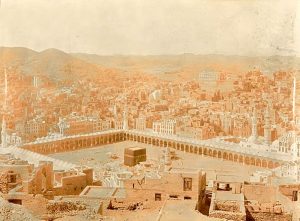
Thus, when in 1975 the Military Government promulgated the Nigeria Pilgrims decree No. 16 of May 1975, vesting all aspects of Hajj Management in the Nigeria Pilgrims Board, headed by late Sheikh Mahmud Gumi of blessed memory, it was a welcome relief, signaling Government determination to safeguard the interest and welfare of its citizens and to protect the Nation’s honour and integrity in the comity of other nations.
The promise of Decree No. 16 of 1975 took some time to realize and very little time to dissipate. Despite some commendable achievements of the Board, the old scourge began to rear its ugly head bedeviled by poor planning, sub- standard accommodation, neglect of the general welfare of the pilgrims and worst of all, botched Hajj airlift operations.
The Nigeria Pilgrims Commission established Decree No.16 of 1989 came into being, then Pilgrims Commission Act, cap 321 law of the federation of Nigeria, 1990, ushered in also with some other set of promises and opportunities.
However, the Nigerian Pilgrims Commission survived for a decade but was disbanded thereafter.
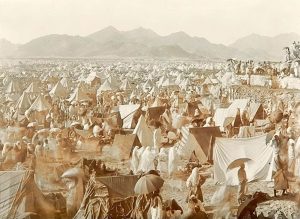
It was succeeded by a variety of ad hoc arrangements coordinated initially from the Ministry of Foreign Affairs and later by the presidency. But all the Task-forces or Ccommittees, whether Ministerial,or Extr-Ministerial (Presidency), the Directorate of Pilgrims Affairs, (DPA),, or Office of The Pilgrims Affairs (OPA), the Technical Committee on Hajj (TCH), or the National Committee on Hajj (NCH), all had made frantic efforts to the next level but atlast succumbed to the unending challenges of Hajj arrangements.
For about three decades, the same questions about proper arrangements for smooth and hitch- free Hajj remained unanswered. Until the last straw that broke the camel’s back in 2005 Hajj operations, when over 11,000 intending pilgrims who paid their Hajj fares but were not able to perform the Hajj due to the inability of Hajj authorities to airlift them to the Holy land.
The situation attracted national hues and cries which eventually culminated in the establishment of the present National Hajj Commission of Nigeria (NAHCON), with the main aim to effectively and efficiently provide a lasting solution to the unending problems of Hajj Operations in the country.
THE JOURNEY SO FAR.
Dark days have gone when the arrangement of Hajj operations was harphazard and was characterized by a harrowing experience.The era of Computer Science is at play now.We cannot imagine the Hajj operations without theTelegraph, Fax, Fascimile, GSM, Internet etc.

Dark days have gone when there were only two Airports in the country( ie Lagos and Kano) and where all the Nigerian intending pilgrims converged rowdly and spent months without even knowing the date of their flights.
Now, pilgrims spend three hours at Camps to be issued their travels documents, in less than two hours, the screening is concluded and in less than two hours, the pilgrims have boarded into the plane and in less than five hours, the pilgrims are already either arriving Jeddah International Airport or directly in Madinah Airport.
The era of rampant flights abortions/cancellations have gone. Now, the over two hundred flights used to be recorded currently, about eighty percent of such flights are successful executed within the scheduled time frame.
The time has gone when the pilgrim would just walk into the market and purchase the size of luggage he likes and spent days at Jeddah Airport without having his luggage weighed and on getting to Nigeria again the nightmare of the pilgrim waiting endlessly begins, sometimes without the luggage.
Days have gone when our weighing centres used to be rowdy like in a market place and the pilgrims demonstrations in the holy land were the order of the day for poor services to the pilgrims.
Dark days have gone when the Tour Operators duped and deceived their clients and left them to their fates in the Holy land and operated at their whims and caprices and got Scot free.
Those days are gone when miscarriages, abortions and deliveries of babies from our female pilgrims and the overstay in the Holy land were the acceptable norms.
Old bad days have absolutely disappeared in Nigerias Hajj operations when the pilgrims falsified their travels documents without detection.
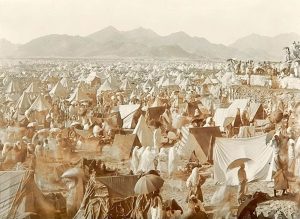
The situations when the picture in the pilgrims’ Passports bears different from the names in the same passport popularly known as (“Ungulu da Kan zabo’) or the rampant passports racketeering at Dogon Gida in Makkah and visa racketeering here in Nigeria are all now things of the past.
Gone are the days when the intending pilgrims pay Hajj fares during the airlift period and Hajj authorities concurrently seek the extension of time to airlift the pilgrims or request from Federal Government loans to pay Service Providers.
Gone are the days when the pilgrims luggage from different Zones could not be distinguished by colour codes and were always missorted causing massive cases of luggage loss.
Gone are the days when pilgrims would carry multiple luggage and as much Zamzam water as he can carry unchallenged and thus overstretching the plane while compromising the Aviation safety.
Gone are the days when the activities of the Hajj affairs were heard by the public only when the inaugural flight Kick starts.
A cursory glance at the epochs of the history of the performance of Hajj operations in Nigeria from the pre amalgamation of Nigeria, the pre colonialism, the post independent to date, there is a great leap forward in Hajj operations in the country as there are tremendous transformations and the operation is thriving to achieve a giant stride but there are still more areas that require more attention in order to consolidate the successes made.
One such area is the issue of making the Hajj Savings Scheme a reality to enable the Nigerian pilgrims pay Hajj fare gradually and allows the Hajj authorities to plan well and early enough.
In cognisance of the policy thrust of the present Government of encouraging farming and diversifying the economy, this trend alone will certainly invigorate the economy and boom and burst the livelihood of the Nigerian people. Soon, the ever increasing cost of Hajj fare, shackled by the prevailing exchange rate, will never be an issue.
l am sure, if the Nigerian Muslims are well to do ,they will be ever ready to use their hard earned money to pay for Hajj fare and to fulfill this important aspect of religious obligation which is a journey of lifetime. The arrangement of Hajj affairs is continuous and everlasting which cannot terminate until the end of the world.
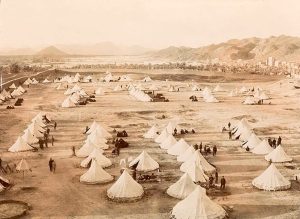



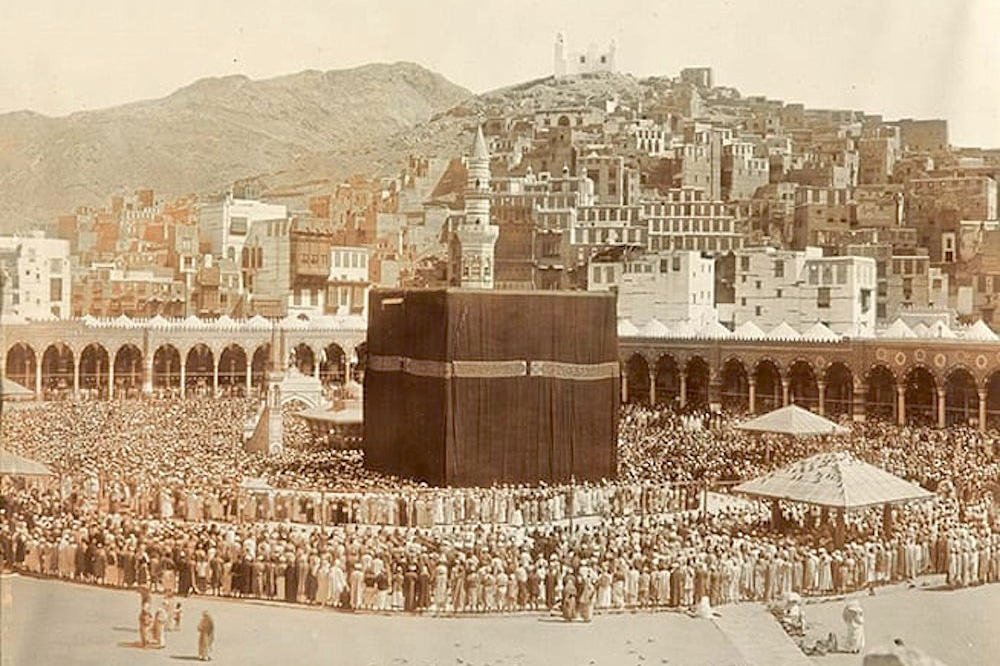





Leave a Reply